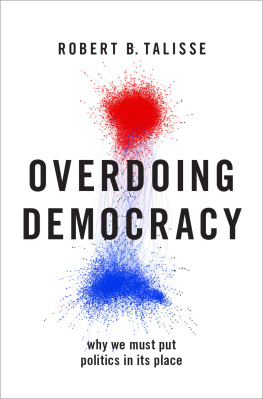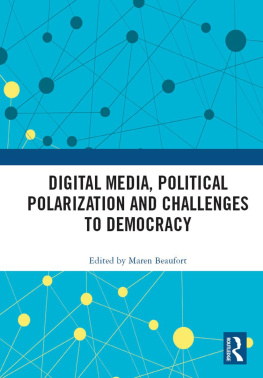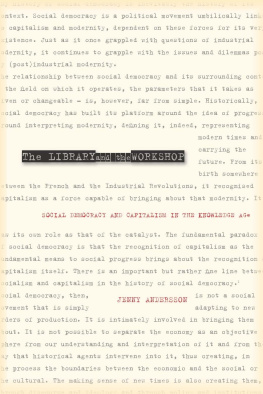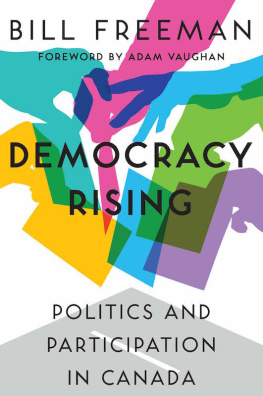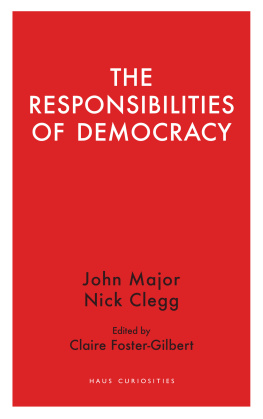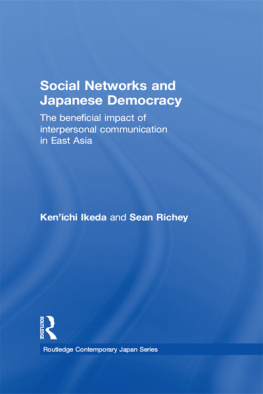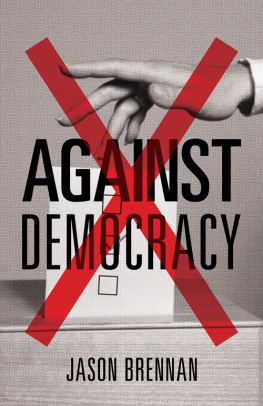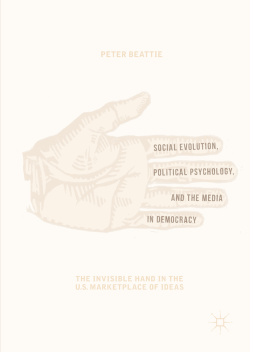Overdoing Democracy

Oxford University Press is a department of the University of Oxford. It furthers the Universitys objective of excellence in research, scholarship, and education by publishing worldwide. Oxford is a registered trade mark of Oxford University Press in the UK and certain other countries.
Published in the United States of America by Oxford University Press
198 Madison Avenue, New York, NY 10016, United States of America.
Oxford University Press 2019
All rights reserved. No part of this publication may be reproduced, stored in a retrieval system, or transmitted, in any form or by any means, without the prior permission in writing of Oxford University Press, or as expressly permitted by law, by license, or under terms agreed with the appropriate reproduction rights organization. Inquiries concerning reproduction outside the scope of the above should be sent to the Rights Department, Oxford University Press, at the address above.
You must not circulate this work in any other form and you must impose this same condition on any acquirer.
Library of Congress Cataloging-in-Publication Data
Names: Talisse, Robert B., author.
Title: Overdoing democracy : why we must put politics in its place /
Robert B. Talisse.
Description: New York, NY : Oxford University Press, [2019] |
Includes bibliographical references and index.
Identifiers: LCCN 2019006875 (print) | LCCN 2019011831 (ebook) |
ISBN 9780190924201 (online content) | ISBN 9780190924218 (updf) |
ISBN 9780190924225 (epub) | ISBN 9780190924195 (cloth : alk. paper)
Subjects: LCSH: DemocracyPhilosophy. | Political participation.
Classification: LCC JC423 (ebook) | LCC JC423 .T2746 2019 (print) |
DDC 321.8dc23
LC record available at https://lccn.loc.gov/2019006875
Contents
The irony is not lost on me. This book is about the need to attend to things other than democratic politics, and yet my entire career as a professional philosopher has been devoted to thinking about democracy. Perhaps it is fitting, then, that I begin by thanking friends and family, most of whom are not academics, who have provided rich outlets for social engagement that are rarely focused on politics. First among these is my wife, Joanne Billett, who remains a source of deep insight, sound advice, new ideas, and, most importantly, attachments to things whose value I otherwise would have overlooked. My mother, Patricia Talisse, supplies support simply by means of her enthusiasm for (almost) anything I do. In the course of writing this book, Ive been benefitted in a similar way by regular discussions and visits with long-time non-philosopher friends with whom I share histories stretching back to the time before I took up an academic career: Theano Apostolou, Donna Baker, Michael Calamari, Matt Cotter, Julie Hwang, Dave McCullough, and Edward Taylor.
Of course, colleagues can also be friends. There is much in this book that has been improved as a result of my friendship and ongoing philosophical collaboration with Scott Aikin. Scott not only read most of the manuscript, he also welcomed scores of impromptu discussions about the ideas it contains. No doubt several of these conversations began as a sudden interruption of his own work, so I am appreciative of his forbearance. In any case, Scott helped me think through many of the details of the view I present here. More importantly, he also provided occasions for thinking philosophically about things other than democratic politics. Another colleague and friend, Jeffrey Tlumak, provided a similar kind of assistance. As anyone who knows him will attest, Jeffrey is the most generous and thoughtful interlocutor one could hope to encounter. Jeffrey also tolerated regular intrusions into his office to ask for advice, guidance, or an intuition-check.
Now for more traditional acknowledgments. The following friends, colleagues, teachers, and students are to be thanked for helping me in writing this book, either by commenting on draft chapters, responding to emailed queries, sharing related work of their own, pressing criticisms and objections at conferences, or simply asking questions in the course of casual discussion: Kristof Ahlstrom-Vij, Elizabeth Anderson, Jody Azzouni, Michael Bacon, Elizabeth Barone, William James Booth, Jonathan Bremer, Thom Brooks, Kimberley Brownlee, F. Thomas Burke, Mary Butterfield, Ann Cacoullos, Steven Cahn, Gregg Caruso, John Casey, Tom Christiano, Caleb Clanton, Matt Congdon, Wout Cornelissen, John Corvino, Rebecca Davenport, Jeroen de Ridder, Idit Dobbs-Weinstein, Catarina Dutilh Novaes, Maureen Eckert, Elizabeth Edenberg, David Edmonds, David Estlund, Carrie Figdor, Elizabeth Fiss, Andrew Forcehimes, Shannon Fyfe, Jerry Gaus, Eddie Glaude, Sandy Goldberg, Lenn Goodman, David Miguel Gray, Alex Guerrero, Hanna Gunn, Michael Hannon, Nicole Hassoun, Michael Harbour, Fiacha Heneghan, Diana Heney, D. Micah Hester, David Hildebrand, Michael Hodges, Shanto Iyengar, Gary Jaeger, Angelo Juffras, Klemens Kappel, David Kaspar, John Lachs, Helene Landemore, Anabelle Lever, Tania Levey, Alyssa Lowery, Michael Lynch, Kate Manne, Michele Margolis, Mason Marshall, Takunda Matose, Amy McKiernan, Darla Migan, Sarah Clark Miller, Josh Miller, Christian Miller, Cheryl Misak, Jonathan Neufeld, Karen Ng, Brian OConnor, John OConnor, Lou Outlaw, John Peterman, Jeanne Palomino, Fabienne Peter, Lyn Radke, Yvonne Raley, Regina Rini, David Rondel, Luke Semrau, Aaron Simmons, Peter Simpson, Karen Stohr, Cass Sunstein, Paul Taylor, Rob Tempio, Lawrence Torcello, Nigel Warburton, Leif Wenar, John Weymark, and Julian Wuerth.
In addition, I thank Lisa Madura for providing exceptional research assistance in addition to good philosophical discussion and sound advice. Once again, Nicole Heller provided expert guidance on matters of grammar and style. I also thank Lucy Randall and Hannah Doyle at Oxford University Press for their guidance and support.
Portions of this book draw from material that was presented at various conferences and other forums. I thank the organizers of the following events and also those who attended them: The Epistemology and Ethics Workshop at Fordham University (September 2016); the Intellectual Humility and Public Deliberation Conference at University of Connecticut (November 2016); the Deliberative Democracy Symposium at University of Canberra (December 2016); the Philosophy Colloquium at University of Nevada, Las Vegas (February 2017); the Philosophy Colloquium at University of Arizona (March 2017); the University of Copenhagen Political Epistemology Workshop (December 2017); the TEDxNashville Conference (March 2018); the Political Epistemology Conference at University of London (May 2018); the Social Epistemology Network Event at University of Oslo (May 2018); the Political Epistemology workshop at Georgetown (October 2018); and the Philosophy Colloquium at Rochester Institute of Technology (November 2018).
Overdoing Democracy
Each November, the people of the United States celebrate Thanksgiving. The holiday is meant to commemorate a group meal between Pilgrims and indigenous people that took place in Plymouth, Massachusetts (or possibly Virginiahistorians disagree) in 1621. The feast was organized in celebration of an especially plentiful harvest. Of course, as is always the case with social origin stories, the actual history surrounding the nations settling and founding is far less idyllic than the Thanksgiving mythology depicts. Nonetheless, today the holiday is celebrated with family over a large dinner, traditionally including turkey and pumpkin pie. Thanksgiving is a day when family, including members who are geographically and temporally extended, gathers to spend time and reflect together on the year that is nearly completed. Hence Thanksgiving is the least commercialized of Americas national holidays.

